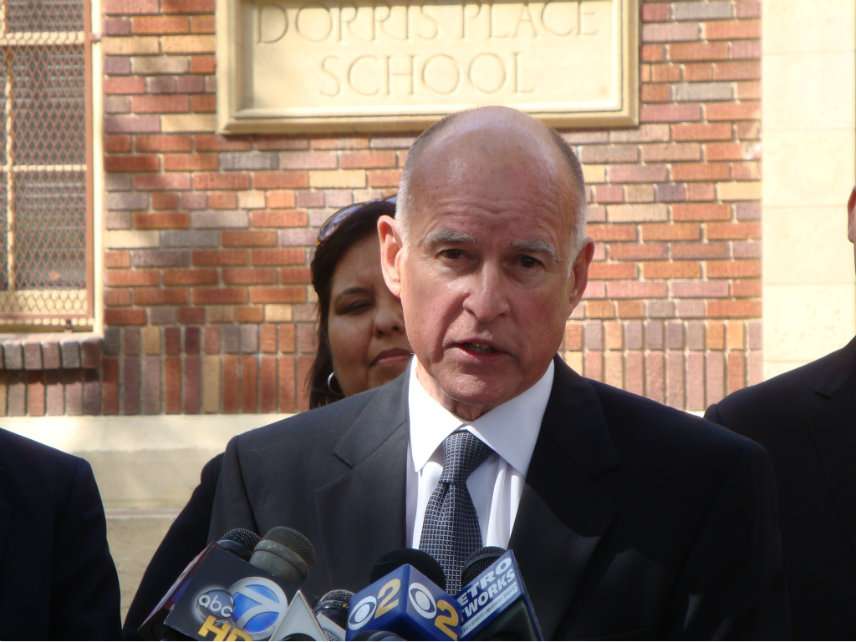Crony Capitalism on Display in California's Cap-and-Trade Re-Authorization
The anti-climate change policy included plenty of sweeteners for favored industries.

The California Legislature has reauthorized the nation's first state-run cap-and-trade program, to the delight of Governor Jerry Brown.
California has already raked in $3.4 billion from cap-and-trade auctions since the Legislature implemented the program in 2012, much of that money going to politically favored projects.
Brown and his allies in the legislature loaded the reauthortization bill, AB 398, with exemptions and sweeteners for favored industries to ensure its passage, angering a diverse set of interest groups and activists in the process.
"This is what good government looks like," said Brown in a statement following cap-and-trade's final passage Monday night.
Shawn Lewis, communications director for the California National Federation of Independent Businesses, saw it a bit differently.
"The way the deals were cut…cutting out small businesses, cutting out working families, who are trying to just live their lives, is a very frustrating state of public policy," Lewis says.
Reauthorization will raise California's gas prices, already some of the highest in the nation, by 15 to 64 cents a gallon by 2021 according to the Legislative Analyst's Office, potentially costing consumers as much as $2 billion a year.
Cap-and-trade—which caps greenhouse gas emissions in the state, and auctions off emitting rights to industry—has already hit small businesses and consumers hard through increased fuel costs Lewis tells Reason.
The Legislature gave away expemptions to lessen the impact on larger industries. A partial sales tax exemption for manufacturers was extended past its initial 2022 expiration date, and was expanded to include power companies and agricultural businesses. Lawmakers suspended a special fire prevention fee on rural landowners.
They included those measures to get politically powerful groups like the Chamber of Commerce and the Western Growers Association on board with cap-and-trade, but did little to convince the small businesses represented by NFIB.
At the same time, the Legislature managed to outrage hardline environmental groups.
"Instead of setting a national precedent for aggressive, equitable climate policy, we rolled out the red carpet for industry," said Amy Vanderwarker of California Environmental Justice Alliance in a press release, adding that "California's most vulnerable communities will bear the burden of these failures."
Also helping to corral support for cap-and-trade reauthorization is the added revenue the scheme would bring from continued auctions of greenhouse gas emitting credits.
Among the beneficiaries of cap-and-trade are California's high-speed rail project—currently a gross greenhouse gas contributor— which nonetheless has received $800 million in funding, while affordable housing developments, hardly a climate change priority, have gotten another $570 million.
The mayors of several California cities backed reauthoritization in the chase for the pork inherent in cap-and-trade. Chris Cabaldon, mayor of West Sacramento, urged a yes vote on the cap-and-trade program on Twitter, pointing out that it was partially funding his city's $150 million streetcar project. Ditto Fresno Mayor Ashley Swearengin, who's relying on the program to fund renovations of a hundred-year-old downtown hotel.
All of this in the name of environmentalism and underwritten by businesses not favored by elected officials, Lewis says.
"We're increasing costs on small businesses to pay for high-speed rail, to pay for credits to buy Telsas," he says. "I don't know how that's saving the environment. I don't know how that's preventing the sky from falling."
Rent Free is a weekly newsletter from Christian Britschgi on urbanism and the fight for less regulation, more housing, more property rights, and more freedom in America's cities.


Show Comments (50)